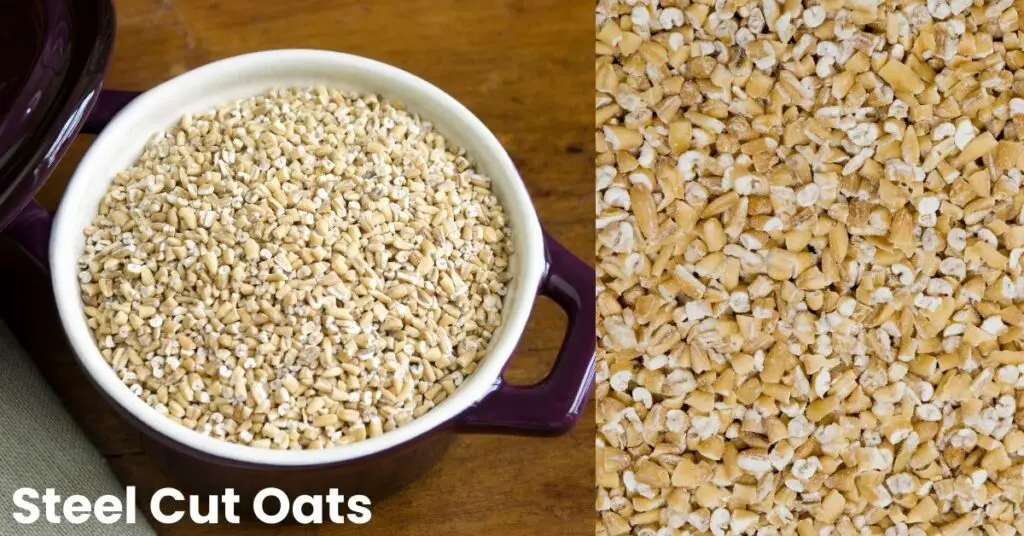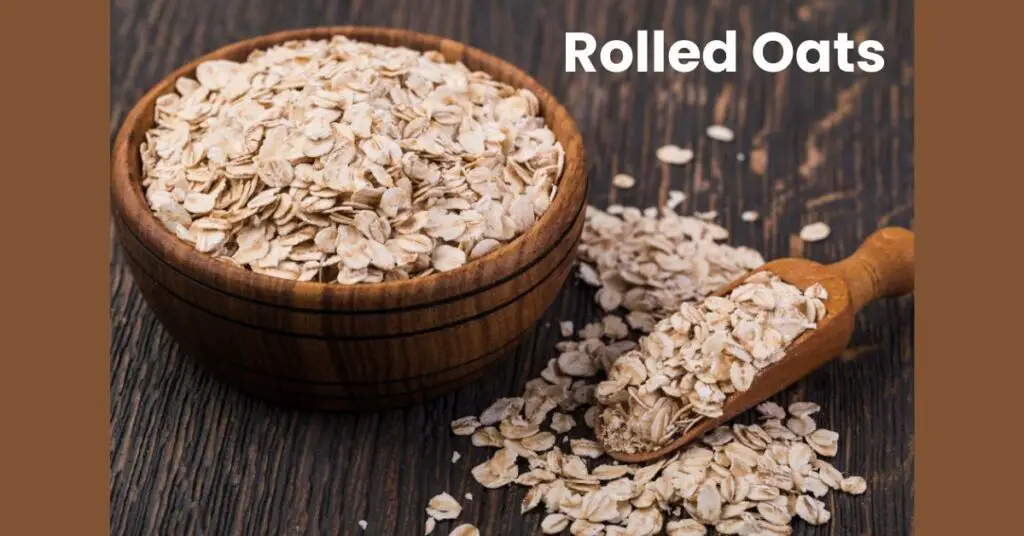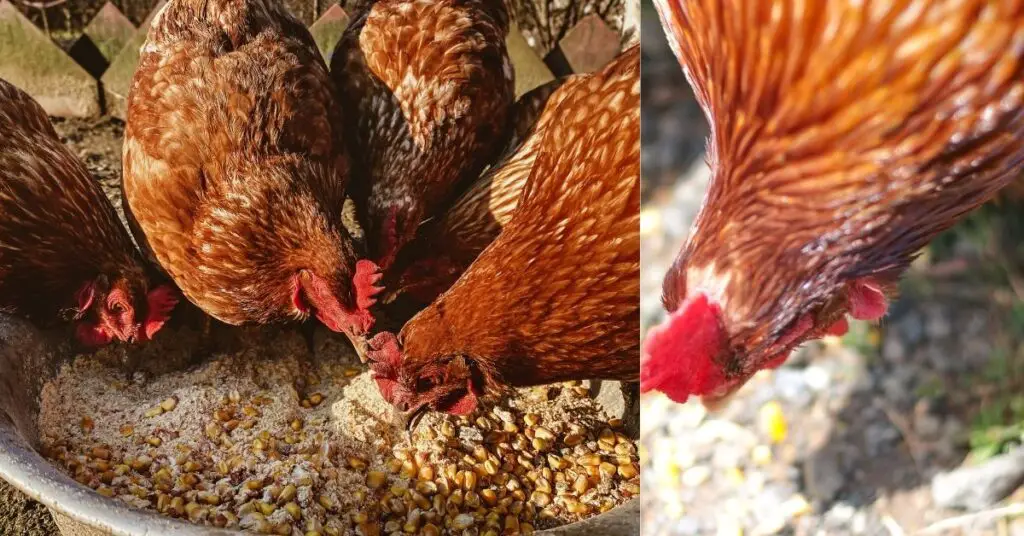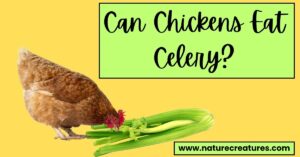The chicken owner attempts to supply a variety of nutritious foods to keep the birds healthy and active. It should be as nutrient-dense as possible. But we’re curious if chickens can eat oats.
Yes, oats are an excellent source of nutrition for chickens. In the winter, we can offer oats to our chickens. Cooked oats are high in nutrients and appetizing to our flocks.
What are oats?
Oats are a whole-grain product. It’s a cereal grain that’s grown for its seeds. They were significantly later than wheat and barley in being domesticated and cultivated. It’s a type of oatmeal that’s popular all over the world. Breakfast is the most common use for it. It’s also delicious to eat. However, it is also a tasty treat for your animals and chickens. It was enjoyable to eat. It has a high carbohydrate and fiber content.
8 Types Of Oats:
Different types of oats are present on the shelves of any market or store. Oats come in a variety of varieties, as listed below.
• Oat Groats (Whole)

It’s also known as “oat berries.” There are no cuts, flakes, or grains on it. Only the husk remove from the entire kernel. Cooking takes longer than with other oats. The cooking time is between 50 and 60 minutes. This variety of oat has a very high nutritional value.
• Steel Cut Oats

Steel Cut Oats, commonly known as Irish Oats, is a type of oat which cut into thin slices. Steel-cut oats are toasted groat oats chopped into small chunks with a steel blade. The cooking time is approximately 20 minutes. They have a chewy feel after being cooked.
• Scottish Oats
These oats use to make porridge. It takes on a creamy texture once cooked. Cooking time is 10–12 minutes on the stovetop and 5 minutes in the microwave.
• Rolled Oats

Regular and old-fashioned oats are other names for rolled oats. This popular oat variety is available for purchase. It steamed oat groats that rolled into thicker flakes than quick oats. Steam softens the groat oats, and after that, flatten them with metal rollers. It’s adaptable and used in various recipes, including oatmeal, milk, and granola. On the burner, it takes 10–20 minutes; in the microwave, it takes 2–5 minutes.
• Quick Cooking
Oats are the most well-known and extensively used kind nowadays. The rolled oats used in quick-cooking recipes are even more thinly rolled than regular oats. These oats cook faster than most because the steaming process takes longer, allowing water to be absorbed quickly. It doesn’t have a strong flavor. The texture is softer and mushier. In most cases, the cooking procedure takes about 1–3 minutes.
• Instant Oats

Oat groats cooked and flaked are known as “instant oats.” Instant oatmeal is frequently flavored and sweetened. Cooked and dried rolled oats are commonly used to make it. It is simple to prepare and also the quickest. It must be soaked in water for around 1-3 minutes before it is ready to eat.
• Oat Bran
Oat Bran is removed from the oats to make a more prosperous and creamier cream. Bran contains the most fiber of any oat. Boiling on the stovetop and cooking in the microwave are both parts of the culinary process. The cooking time is around 5 minutes.
• Oat Flour
It’s similar to groat oats. After hulling and cleaning, the bran, germ, and endosperm remain intact. With its nutty flavor, oat flour can be used instead of wheat flour when baking cakes, bread, and cookies.
Are Oats Okay for Hens To Eat?
Yes, oats are a good source of protein for your chickens. The majority of people utilize it to raise animals. Chickens enjoy oatmeal as a treat. It has a high magnesium, thiamine, zinc, and phosphorus content due to its abundant minerals, vitamins, and antioxidants. These nutrients aid in the health and activity of your poultry buddies.
11 Health Benefits of Using Oats for Your Chickens
It is best first to determine whether or not using oat treats for your chickens is beneficial to their health. These are a few of the advantages listed below:
• Magnesium
Magnesium is abundant in oats. The formation of chicken bones requires this mineral. It also helps to activate several enzymes. Magnesium deficiency can affect chickens’ calcium homeostasis and vitamin D levels. When something like this happens, it raises the risk of certain diseases developing.
Diseases of the cardiovascular system may affect chickens. Their bone density and growth, as well as their metabolism, may be affected. Magnesium is also essential for the development of young chickens. If they are deficient in magnesium, it may affect their growth and development. It can result in drowsiness or even death in some cases.
• Vitamin B1 (Thiamine )
When hens are deficient in thiamine or vitamin B1, their energy production is affected, particularly the conversion of sugar (glucose) to fat. A chicken deficient in Vitamin B1 may be unable to eat. They may need more energy to eat or drink or find it challenging. Due to their inability to eat for themselves, they can start to lose weight. They will lose their ability to walk and move if this continues.
It can be a severe problem for chickens when they become paralyzed. It usually begins with their legs, but it can quickly spread to their entire body, including their wings and necks. As their condition worsens, they may perish. Your chickens require a well-balanced diet to prevent these things from happening. Thiamine, or Vitamin B1, is abundant in oats. You should begin including this in your chickens’ food immediately.
• Manganese
Add oatmeal to your chicken meals if you’re looking for a source of manganese. Manganese is an essential nutrient for chickens, particularly in terms of reproduction. It’s also necessary for the development of eggs. Laying chickens with insufficient manganese may lay eggs with thinner shells and other defects. Physical problems may be present in the chicks born from these eggs.
Persis can develop in young hens who are deficient in manganese. Slipped tendons are a symptom of this illness, which can impair their legs. Apart from the possibility of being unable to walk, their legs may become thicker and shorter than usual.
• Pantothenic acid (Vitamin B5)
Many foods contain vitamin B5, including oatmeal. If your chicken lacks pantothenic acid, you can supplement its diet with oatmeal.
A chicken deficient in Vitamin B5 may experience skin and neurological system problems. Their adrenal glands, more precisely their adrenal cortex, would also be damaged. If your chickens display any of the following symptoms, it could indicate that they require more Vitamin B5 in their system:
a. Between the toes and feet, there is flaking and cracking
b. flakes around the beak, especially in the corner
c. Feathers that are brittle and harsh
d. Stunted growth and feather development
Egg production in laying chickens could be affected. They might have a smaller egg-laying capacity. Additionally, there is a chance that the embryos inside their eggs will suffer damage. There’s a good chance that chicks born from these eggs will also be weak. There’s also a danger that these chicks will die soon after hatching.
• Phosphorus
This mineral is necessary for bone formation and development. And it’s something you can get in oatmeal. Chickens require phosphorus as well as calcium for proper body development. If chickens do not get enough phosphorus, they can get the following symptoms:
➢ Lameness
➢ beak and bones that are softer
➢ Hock enlargement
➢ Hock swelling Bodyweight reduction
If you want your chickens to avoid this, ensure they have enough phosphorus in their system. It is less likely that chickens will develop these problems if their phosphorus and calcium levels are balanced.
• Zinc
Oatmeal has a significant amount of zinc. If you have zinc-deficient chickens, oatmeal can be of assistance.
If chickens have a modest zinc deficiency, their growth may be slower than usual. Their bones would grow thinner and shorter. Their feathers may appear frizzy and unhealthy. They may also experience breathing difficulties. It is potentially lethal to the chickens.
Chicks born from zinc-deficient hens may also have developmental difficulties. They may appear feeble and find it difficult to eat or drink. Their skeletal structures were frequently the most damaged.
• Aids in cholesterol reduction
Oats contain more soluble fiber than grains, which helps lower cholesterol. These soluble fibers aid in the reduction of LDL cholesterol levels.
• Improving bone health
Oats are a good source of silicon, which is vital for your flock’s skeletal health. The calcium content of oats is also good for the strength of your chicken bones.
• Energy Booster
Because they are abundant in carbohydrates, oats are an excellent choice for breakfast. The substantial vitamin B content will increase the energy levels of your flock. You’ll have fewer energy crashes because of the high fiber content.
• Cancer risk reduction
Oats are high in lignin, which helps to prevent cancer-related hormonal imbalances. Oats include Vitamin C, which aids in the fight against cancer-causing free radicals.
• Improve the cardiovascular health
Oats are high in antioxidants, which combat free radicals and enhance heart health. Oats absorb cholesterol and help lower it, acting like blotting paper. Oats include vitamin E, which helps to prevent cardiovascular disease.
Can chickens eat raw oats?

Feeding chickens raw oatmeal is a possibility. It is safe to eat raw oats. You can skip cooking the oats to keep more protein and fiber.
You can feed raw oatmeal to your chickens. You can watch how they react. Continue doing what you’re doing if it appears to be something they enjoy eating. To the oatmeal, you can also add water. To the oatmeal mixture, you can add warm water. It softens the oats, making them softer than raw oats. The chickens would love a warm bowl of oats in the cold.
Feed oats in moderation

As the owner or keeper of your chickens, you must know how much food to feed them. When chicks consume oatmeal, the same concept applies. It would be best to ensure that everything they consume is balanced. It begins when they hatch and continues until they are fully grown chickens. As with any other meal you feed your chickens, ensure you do it in moderation.
You can only sometimes keep your chicken on an oatmeal diet. The hen diet must consist of a range of foods. It guarantees they receive the proper vitamins, minerals, and nutrients. Overdoing it may result in dietary concerns, impacting their general health and well-being.
Health Risk of Feeding Too Many Oats
We can all agree that oats are one of the healthiest and most nutritious treats available to your chickens. However, if you want them to continue to benefit from eating oats, you must limit how much they should consume. Overconsumption of oats, like any other food, can harm one’s health.
- Oats contain primarily fibers and starch (a refractory and slow-digesting carbohydrate). If the hens eat too many oats, they will have difficulty digesting them.
- Oats, like most other grains (rye, wheat, etc.), are high in beta-glucans, an indigestible fiber that can digest nutrients ingested. It’s because beta-glucan binds to water and other nutrients in your hens’ digestive tract.
While it is innocuous in little doses, the problem arises when it accumulates inside their bodies. These fibers can cause a nutrient deficiency in yourself, obstructing your intestines and leading to death.
Conclusion
Yes, chickens can consume oats. In fact, like treats, they’re darn good for them!
Oats are very nutritious cereal grains that provide numerous health benefits to hens. This toasty grain is a delicious winter treat and an excellent source of carbohydrates. However, oats should not be used as a routine feed for chickens because they harm their health if provided in excess.
Some chicken keepers regard oats as an optional but exceptionally healthy treat that works well to transition chicks and brooder chicks from their mother’s warm tummy to ordinary chicken feed.



